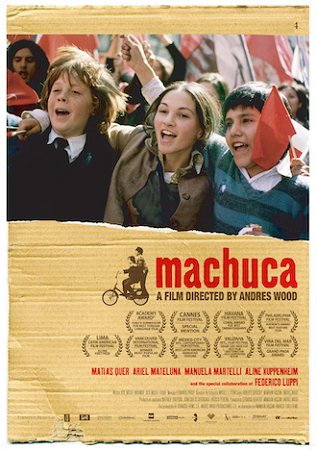
Machuca 2004
Distributed by Pragda, 302 Bedford Ave., #136, Brooklyn, NY 11249
Produced by Andrés Wood
Directed by Andrés Wood
Streaming, 120 mins
General Adult
Adolescents; Chilean history; Protest movements; Revolution
Date Entered: 05/15/2023
Reviewed by Elena Landry, George Mason Libraries, Fairfax, VAOne need know nothing of the 1973 U. S. backed overthrow of the democratically elected government of Chile and assassination of its president Salvador Allende to appreciate this powerful coming of age story of two boys from markedly opposite poles of society. While the film is unflinchingly set in Santiago during the time immediately preceding Pinochet’s coup, the focus is on the experience of the two main characters rather the politics of the period.
The story is told from the viewpoint of Gonzalo Infante, a child of privilege whose father is the complaisant cuckold husband of a jaded Jackie Onassis wannabe who takes her young son along with her on her adulterous trysts with her aging sugar daddy. In highlighted contrast, Pedro Machuca lives in a shanty town with dirt floors and a communal outhouse. His mother tills a subsistence garden with a swaddled baby alongside and his absentee father only shows up to beat her for drinking money.
Admiring Pedro’s pluck from his first subsidized day in the elite school, Gonzalo and he become fast friends, bonding over their shared harassment from the class’s nascent fascist bully and his cronies, and a mutual enthusiasm for the adventures of the Lone Ranger. They progress through the excitement of political protests and teenage party alcohol to boyhood crushes on the same girl. The condensed milk kissing scene with the prepubescent temptress Silvana perfectly captures the heady thrill of fleeting youth.
The thrill is decidedly gone however when Gonzalo’s mother leads a gang of harpy fashionistas in attacking Silvana at a protest, and things go inexorably downhill from there. The two friends who shared the dream of someday becoming priests like their beloved Father McEnroe are torn apart by historical events and the pull of their different social status. Gonzalo ultimately claims the protection of his privileged class to escape his friend’s fate when the military demolishes Pedro’s neighborhood and hauls everyone off.
Without giving any more away, I’ll conclude by saying that this film is filled with masterfully crafted, powerful scenes that will impress anyone with clear eyes and an open heart. I’d highly recommend it to anyone.
Awards: Chile’s submission best foreign language film, Academy Awards; Special Mention, Cannes Film Festival; Coral Award for best cinematography, Havana Film Festival; Ecline first prize, Lima Latin American Film Festival; Audience Award Best Feature Film, Philadelphia Film Festival; Most Popular Film, Vancouver International Film Festival; Best Latin American Narrative Feature, Mexico City Int’l Contemporary Film Festival; Grand Jury Prize for Best Film, Best Director, and Best Supporting Actor, Valdivia International Film Festival; Grand Paoa Award, Vina Del Mar Film Festival
Published and licensed under the Creative Commons Attribution 4.0 license. Anyone can use these reviews, so long as they comply with the terms of the license.